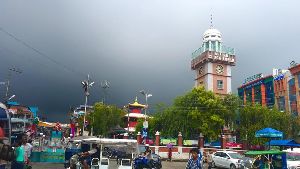Biratnagar – The Gritty, Flavored, No-Filter City of the East

A Bit of Biratnagar’s Backstory
Biratnagar may not be ancient like Bhaktapur or spiritual like Lumbini, but it carries its own kind of legacy:
-
The Industrial Backbone: Biratnagar is Nepal’s industrial capital. It’s where the first jute mill was established in 1936, kickstarting Nepal’s industrial age.
-
Birthplace of Movements: It’s also politically important — the city played a key role in Nepal’s democratic revolution.
-
Rooted in the Mahabharata: The name “Biratnagar” traces back to the legendary King Virata from the Mahabharata. According to the epic, this was the place where the Pandavas spent their incognito exile.
-
Cultural Mashup: Located near the Indian border, the city blends Maithili, Tharu, Bhojpuri, and Pahadi cultures — making it a flavorful mix of traditions, languages, and lifestyles.
Why Backpackers Shouldn’t Sleep on Biratnagar
Most travelers skip Biratnagar — which is exactly why you should go.
-
Untouched by Tourism: No overpriced cafes trying to sell you “authentic experiences.” Everything here is actually authentic.
-
Ridiculously Affordable: Street food for under NPR 100, comfy rooms for under NPR 700, and local rides for less than a dollar.
-
Local Flavors Everywhere: From spicy chaat to sugarcane juice to deep-fried sweets — your food adventures will explode here.
-
Gateway to Koshi Tappu and Dharan: Biratnagar is the perfect base to explore Eastern Nepal’s hidden gems.
-
Friendly Faces, Real Conversations: Locals are curious and chatty — not salesy. You’ll get invited for tea more than once.
Must-Visit Places in Biratnagar
Here’s my personal list of stops you shouldn’t miss:
🏞️ Aqua Park
Yes, a water park in Biratnagar! It’s not huge, but it’s fun and great for a chill afternoon.
🌳 Baraha Kshetra (1 hr drive)
Where the Koshi River meets spiritual legends. Take a day trip — it’s a peaceful break from city buzz.
🛕 Kali Mandir
Located in the heart of the city — alive with prayers, incense, and bells, especially during festivals.
🛍️ Biratnagar Haat Bazaar
This weekly open-air market is wild — you’ll find secondhand shoes next to samosas and wedding sarees. It’s chaos in the best way.
🧴 The Old Jute Mill
If you love rustic, industrial backdrops for your travel photos — this semi-abandoned site gives total "vintage Nepal" vibes.
Hidden Gems and Offbeat Experiences
Biratnagar’s magic lies off the main roads:
🚲 Bike Ride to Tinkune or Dainiya
Rent a bicycle and ride out of the city. You’ll see mustard fields, buffalo herders, and sleepy villages that look frozen in time.
🐦 Koshi Tappu Wildlife Reserve (2 hrs away)
Rent a scooter or grab a shared jeep — this wetland area is a birdwatcher’s paradise, with wild buffaloes and peaceful riverbanks.
🎭 Local Theater at Rastriya Nachghar
Catch a local drama or comedy show — you won’t understand every word, but the energy is universal.
Only-in-Biratnagar Experiences
-
Street Food Walk through Roadshesh Chowk
Start with pani puri, grab a plate of aloo chop, then finish off with hot jalebis and a clay cup of chai. -
Morning in the Local Gym or Park
Biratnagar wakes up early. Join locals in morning yoga or a cricket match in the public park — you’ll feel instantly plugged in. -
Ride a Shared Rickshaw with Locals
You haven't lived until you’ve squeezed into a cycle rickshaw with three strangers and a sack of onions. -
Shop at Mahendra Chowk
Try bargaining for fake Ray-Bans, local lungis, or knockoff headphones — even if you don’t buy, it’s entertaining.
Backpacker Travel Tips: Getting Around & Surviving Like a Local
🛺 How to Get Around
-
Cycle Rickshaws – Slow but iconic. Negotiate fare before hopping in.
-
Tempo (Electric Rickshaws) – Cheap and common.
-
Rent a Bike – NPR 500–700/day if you ask around local shops.
-
From Kathmandu – Night buses (NPR 1,200–2,000) or flights (45 mins, NPR 4,500–6,000).
🏨 Hostel & Budget Stay Scene
Biratnagar doesn’t have classic hostels, but these are great picks for backpackers:
-
Hotel Eastern Star – Budget-friendly and clean.
-
City Guest House – Basic, cheap, close to chowks.
-
Biratnagar Inn – Mid-range but often gives discounts if you ask in person.
💸 Budget Tips
-
Eat where the crowd is — small local shops serve giant plates at tiny prices.
-
Skip cafes; go for tea stalls. You’ll meet people and pay NPR 20 for great chai.
-
Buy snacks from roadside vendors instead of supermarkets.
📱 Must-Have Apps
-
Pathao or Tootle – Limited in the east but works occasionally.
-
Maps.me – For navigating narrow gallis (alleys).
-
Google Translate – English isn’t widely spoken, so this helps a lot.
🧍 Local Etiquette
-
Always greet with “Namaste”.
-
Don’t wear revealing clothes — locals dress modestly.
-
Don’t rush — people move at a slow pace here.
Best Time to Visit Biratnagar
🌸 Spring (March–May)
Warm, colorful, and full of festivals. Best season for biking and local exploration.
🌧️ Monsoon (June–August)
Hot and humid. Expect heavy rain, muddy streets, and flooded alleys. But hey — street food is still on point.
🍁 Autumn (Sept–Nov)
The sweet spot. Clear skies, dry roads, and lots of cultural festivals.
❄️ Winter (Dec–Feb)
Surprisingly cold in the mornings. But sunny days and fewer crowds make it budget-backpacker-friendly.
Final Thoughts
Biratnagar won’t pamper you, but it’ll show you the real Nepal — raw, flavorful, and buzzing with life. It’s where your hands will smell like spices, your shoes will get dusty, and your travel stories will get real. This isn’t a place for passive tourism. It’s a city for backpackers who want to dig deeper, ride dirtier, and connect more authentically.
So, if you’re done with the filters and ready for the flavor — pack your bag, bring your appetite, and meet me in Biratnagar.

